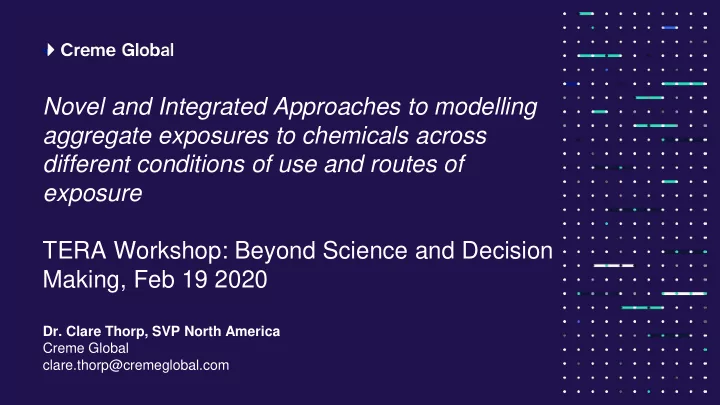

Novel and Integrated Approaches to modelling aggregate exposures to chemicals across different conditions of use and routes of exposure TERA Workshop: Beyond Science and Decision Making, Feb 19 2020 Dr. Clare Thorp, SVP North America Creme Global clare.thorp@cremeglobal.com
About Us We are a Scientific Modelling, Data Analytics and Computing Company. Our Mission To enable better decision-making in a complex world.
Some of our clients Services Cosmetics & Fragrances Chemical Gov & Academia Food Associations
Foresight Developing Predictive Models Insight Analysing and Visualising the Data Understanding Structuring, Validating and Sharing Gathering Data Collect the Data Data Science Challenges
Novel and Integrated Approaches to modelling aggregate exposures to chemicals across different conditions of use and routes of exposure Some of The Challenges: 1. Data, or lack thereof 2. Data, confidentiality 3. Data, from multiple sources CASE STUDY: RIFM
Case Study Creme RIFM Model A tool to estimate aggregate exposure from consumer product ingredients. ● Cosmetics, personal care products, air care products and household cleaning products. ● United States and Europe populations. ● Systemic, Dermal, Inhalation, Ingestion. ● Probabilistic model based on real world data. ● Flexible and customizable.
What Are the Data needs? Frequency Amount Consumed Concentration Exp = F x A x C x R x P BW or SA Penetration Factor Retention Factor Anthropometric Data
Deterministic Method
Percentile Exposure
The Solution Aggregate exposure based on actual product consumption surveys and distributions of data provided is more realistic. E.g. Amount of Toothpaste consumed 2g vs.
Frequency of Use Kantar Worldpanel Exp = F x A x C x R x P B W
Kantar - Online Consumption Diaries
Amounts Used Kantar Worldpanel Research Literature Exp = F x A x C x R x P B W
Amounts Used → COLIPA (Hall et al ., 2007; Europe 2011) → Ficheux et al. , 2016 → CTFA (Loretz et al ., 2005; USA 2006; 2008) Hydroalcoholics → Tozer et al ., 2004
Concentration of the fragrance chemical in the final product Kantar Worldpanel Research Literature Manufacturers Exp = F x A x C x R x P B W
Fragrance Concentration Consumer Product Companies Fragrance Manufacturers
Two-level Concentrations
Retention Factor Kantar Worldpanel Research Literature Manufacturers Exp = F x A x C x R x P B W Research Literature
Retention Factors (Examples) Dermal Ingestion Inhalation Body Lotion 1 Shampoo 0.01 DeoSpray 0.235 0.0127 Toothpaste 0.1 0.05 Eau de Toilette 0.8 0.00363
Penetration Factor Kantar Worldpanel Research Literature Manufacturers Exp = F x A x C x R x P B X % W Research Literature
Anthropometric Data Kantar Worldpanel Research Literature Manufacturers Exp = F x A x C x R x P B 100% W Research Literature Population Surveys
Height and Weight Data US 2009-2014 NHANES Survey Body weight and height data for 14,000 US Subjects EU France INCA2 Poland Kilmek-Piotrowska et al. , 2015 Others NHANES data scaled based on EU country average weights and heights
Surface Area Calculations Du Bois Formula SA = a x W b x H c Head, trunk, arms, hands, legs and feet.
Multiple sources of data Multiple conditions of use Multiple routes of exposure Kantar Worldpanel Research Literature Manufacturers Exp = F x A x C x R x P B 100% W Research Literature Population Surveys
How does the data get pulled together? Frequency Amount Consumed Concentration Exp = F x A x C x R x P B Penetration Factor W Retention Factor Anthropometric Data
The problem is that the data comes from different people…. Frequency People Amount Consumed Concentration Penetration Factor Retention Factor Anthropometric Data
Monte Carlo Simulation Example - Triangular Distribution Lower limit: 1g Upper limit: 8g Mode: 3g
Monte Carlo Simulation 10 Subjects
Monte Carlo Simulation 1000 Subjects
Population Exposure Modelling
Population Exposure Modelling Age: 18-25
Individual Exposure
Individual Exposure
Individual Exposure
Individual Exposure
Individual Exposure
Individual Exposure
Individual Exposure
Individual Exposure
Population Exposure
Software
How is the exposure model used?
Many ways to consider exposure People : Everyone or Consumers only Time : Chronic or Acute Route : Dermal, Inhalation, Ingestion, or Systemic Product : Aftershave, Bar soap, Shampoo, etc. Grouping : Product, Category, or All Products Site : Palms, Wrists, Arms, Back, Stomach, etc. Statistic : Minimum, Median, Mean, P90, P95, etc.
Publications Comiskey et al . (2015). Novel database for exposure to fragrance ingredients in cosmetics and personal care products. Regul Toxicol Pharmacol. 72(3): 660-72. doi: 10.1016/j.yrtph.2015.05.012 Safford et al . (2015). Use of an aggregate exposure model to estimate consumer exposure to fragrance ingredients in personal care and cosmetic products Regul Toxicol Pharmacol 72(3): 673-682. doi: 10.1016/j.yrtph.2015.05.017 Safford et al . (2017). Application of the expanded Creme RIFM consumer exposure model to fragrance ingredients in cosmetic, personal care and air care products Regul Toxicol Pharmacol. 86: 148-156. doi: 10.1016/j.yrtph.2017.02.021 Comiskey et al . (2017). Integrating habits and practices data for soaps, cosmetics and air care products into an existing aggregate exposure model. Regul Toxicol Pharmacol. 88: 144-156. doi: 10.1016/j.yrtph.2017.05.017
Thank You. clare.thorp@cremeglobal.com Creme Global 4th Floor, The Design Tower, Trinity Technology & Enterprise Campus, Grand Canal Quay, Dublin 2, Ireland, D02 P956 +353 (1) 677 0071 info@cremeglobal.com www.cremeglobal.com
Capabilities Exposure Assessments Optimisation Assessments Highly configurable Highly customisable Data exploration
Recommend
More recommend